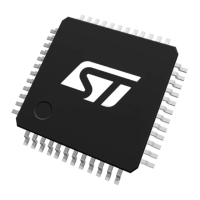Debug support (DBG) RM0444
1372/1390 RM0444 Rev 5
40.7.1 BPU functionality
The processor breakpoints implement PC based breakpoint functionality.
Refer the Armv6-M Arm and the Arm CoreSight Components Technical Reference
Manual
for more information about the BPU CoreSight identification registers, and their
addresses and access types.
40.8 DWT (Data Watchpoint)
The Cortex
®
-M0+ DWT implementation provides two watchpoint register sets.
40.8.1 DWT functionality
The processor watchpoints implement both data address and PC based watchpoint
functionality, a PC sampling register, and support comparator address masking, as
described in the
Armv6-M Arm.
40.8.2 DWT Program Counter Sample Register
A processor that implements the data watchpoint unit also implements the Armv6-M
optional
DWT Program Counter Sample Register (DWT_PCSR). This register permits a
debugger to periodically sample the PC without halting the processor. This provides coarse
grained profiling. See the
Armv6-M Arm for more information.
The Cortex
®
-M0+ DWT_PCSR records both instructions that pass their condition codes and
those that fail.
40.9 MCU debug component (DBG)
The MCU debug component helps the debugger provide support for:
• Low-power modes
• Clock control for timers, watchdog and I2C during a breakpoint
40.9.1 Debug support for low-power modes
To enter low-power mode, the instruction WFI or WFE must be executed.
The MCU implements several low-power modes which can either deactivate the CPU clock
or reduce the power of the CPU.
The core does not allow FCLK or HCLK to be turned off during a debug session. As these
are required for the debugger connection, during a debug, they must remain active. The
MCU integrates special means to allow the user to debug software in low-power modes.
For this, the debugger host must first set some debug configuration registers to change the
low-power mode behavior:
• In Sleep mode: FCLK and HCLK are still active. Consequently, this mode does not
impose any restrictions on the standard debug features.
• In Stop/Standby mode, the DBG_STOP bit must be previously set by the debugger.
This enables the internal RC oscillator clock to feed FCLK and HCLK in Stop mode.

